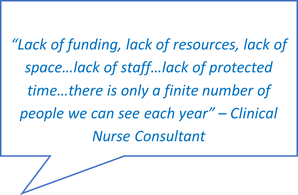Thanks to better diagnostics, medicines and access to healthcare, the 5-year overall survival rate for children with cancer has increased from 30% in the 1960’s to over 80% in recent times. In fact, adults who had cancer as a child have a very good chance of not only surviving but going on to live productive lives, especially if they are able to access long-term, comprehensive, cancer survivorship care.
Children who have survived cancer face a lifelong risk of developing complex, chronic, and comorbid health concerns such as cardiovascular, endocrine and reproductive problems as well as concerns related to the central nervous system such as learning disorders, and epilepsy. In addition to this, some children may develop social, functional and mental health concerns, compromising their overall quality of life.
Despite advancements being made in the treatment of childhood cancer, the challenge to provide optimal survivorship care that is feasible, engaging and equitable is a global focus. While there is recognition that long-term survivorship care should be integrated across primary and tertiary systems, clinicians and researchers acknowledge that a one-size-fits-all approach is not suitable, begging the question, how can our healthcare professionals best support cancer survivors?
| A recent study entitled, ‘Childhood cancer survivorship care: A qualitative study of healthcare providers’ professional preferences’ explores the views of health professionals within a multidisciplinary team of oncologists, nurses, GP’s and hospital directors, on the limitations of current models of care, as well as the critical components of survivorship care. |
Delivering complex care encompasses risk-based surveillance, the management of late-effect comorbidities, and the recognised psychosocial impacts associated with the diagnosis of cancer. Creating an optimal survivorship care-plan requires the proactive involvement of other multidisciplinary medical specialists as well as a network of allied health professionals, bridging the gap between primary and tertiary care.
| However, oncology staff expressed difficultly in securing enough protected time to contribute to survivorship clinics, over and above other clinical roles, reflected in the following recount from a clinical nurse consultant “Lack of funding, lack of resources, lack of space…lack of staff…lack of protected time…there is only a finite number of people we can see each year”. |
Study findings also highlight key to achieving optimal survivorship care, one of is GPs’ low confidence in providing up-to-date care for childhood cancer survivors. This is understandable considering that GPs reported caring, on average, for only two childhood cancer survivors across their career (an average of 28 years). Nonetheless, GP-led care was seen to overcome the many logistical and financial issues families faced when trying to access tertiary-led care, which is usually localised to major urban cities. A male GP reflected on this, voicing “When the family goes up to Sydney ... it costs a fortune to stay up there and [they] can’t afford it”. In addition to overcoming these barriers, GPs are seen as facilitators of patient-centred care and provide a sense of long-term continuity and opportunity for whole-family care.
Participants proposed several strategies to overcome insufficient funding, limiting the provision of survivorship services. These strategies included increasing the responsibility of lower-cost nurses (compared to oncologists), facilitating nurse-led educational programs, and creating specific Medicare Benefit Schedule item numbers. These numbers would allow hospitals and GPs to claim greater funding and remuneration for the more complex consultations that survivors need to support their care.
Further, harnessing distance-delivered care pathways created during the COVID-19 pandemic such as telehealth consultations may reduce some of the time/cost limitations that have been traditional barriers to accessing survivorship care. By developing more cost efficient and equitable care solutions, survivorship care will be accessible to regional and rural families, as well as the metropolitan families who do not live close to the few survivorship clinics in Australia.
As more patients are surviving cancer and living longer lives, the need for optimal and sustainable, survivorship care continues to grow. Fostering collaboration across primary and tertiary care is essential to building a risk-stratified model of survivor-centred care, requiring the ongoing engagement of members within a multidisciplinary team of medical specialists. Funding for roles to manage communication, points of transition, effective care dissemination and data sharing is further required, as is continued research to develop and trial such initiatives.
For full study findings, click here.
Blog written by Alexia Paglia and Dr Jordana McLoone.


 RSS Feed
RSS Feed